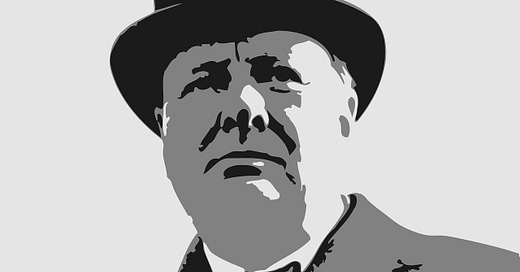Yesterday was Victory in Europe Day. Winston Churchill’s V-E Day Speech, 8 May 1945, isn’t remembered as one of his greatest speeches.
It should be.
As another war sadly rages in Europe, let’s examine this overlooked gem. It has much to teach us about writing, speaking, and how to handle great moments.
Why It’s Overlooked
The back-against-the-wall speech will always fire us up more than the we’ve-won speech. We remember “Give me liberty or give me death” much more than, well, anything said by Washington or anyone else at the end of the Revolutionary War.
By this time, Churchill had served as Prime Minister for almost 5 years. My sense is: the nation had grown a bit tired of him. Less than two months after V-E Day, the British would hand him and the Conservatives a stunning loss in the general election. He was out as PM. This speech gets assigned to that time period more than “Churchill as the Roaring Lion” time period.
He made the speech as a BBC radio broadcast. He spoke from Number 10 Downing Street. In contrast, many of the speeches regarded as his best ones he gave to some sort of live audience: “blood, toil, tears and sweat” address to the House of Commons; same with “victory at all costs” speech; same with “this was their finest hour” speech; his “iron curtain” speech was delivered at Westminster College in Fulton, Missouri. While the human voice can powerfully transmit emotion, nuance and meaning, the combination of hearing a voice and seeing a person simply can’t be beaten. This is true even if you were not in the audience. Knowing at least some people saw the speech live – in-person – activates your imagination about being there far more than merely hearing a speech on the radio. You can feel your spirit soaring at the words and gestures of the speaker in a way radio couldn’t capture.
Why It’s An Outstanding Speech
We sometimes forget that speeches first convey information, then manipulate that information in some way: inspire us, anger us, uplift us, and so on. But primary is the transmission of information. In this case, Churchill’s first job is a simple but profoundly weighty one: tell the nation the war in Europe has ended. His first sentence discloses that critical fact: “Yesterday morning at 2:41 a.m. at Headquarters, General Jodl, the representative of the German High Command, and Grand Admiral Doenitz, the designated head of the German State, signed the act of unconditional surrender of all German Land, sea, and air forces in Europe to the Allied Expeditionary Force, and simultaneously to the Soviet High Command.”
He then answers a question that has likely come into the worried mind of the listener: in such a large war across so much terrain, how will the Germans (who are fighting my son in the British infantry) know the war has ended? It’s murky and Churchill recognizes this uncertainty: “The Germans are still in places resisting the Russian troops, but should they continue to do so after midnight they will, of course, deprive themselves of the protection of the laws of war, and will be attacked from all quarters by the Allied troops. It is not surprising that on such long fronts and in the existing disorder of the enemy the orders of the German High Command should not in every case be obeyed immediately.”
With the facts announced, Churchill then offers a brief, and poignant, history of the war. One phrase in this section is especially memorable: “after gallant France has been struck down.” He includes the capitulation of France in this history: it was a key moment in the war. He does not dwell on it or cast blame. And he uses the adjective “gallant” to describe France in that moment of surrender.
Aristotle argues that the great man, the man of virtue, would possess “magnanimity.” He would act with a loftiness of spirit, show a generous spirit, and proceed with freedom from pettiness. In using the word “gallant,” I believe Churchill revealed his magnanimity and the greatness of this speech.
Churchill ends the speech with a reminder to the British people that while the war in Europe has ended, the war in Asia continues. “We must now devote all our strength and resources to the completion of our task, both at home and abroad. Advance, Britannia! Long live the cause of freedom! God save the King!” It’s an appropriate and stirring conclusion, especially his line: “Long live the cause of freedom!” It is his final reminder of why Britain entered the war against Germany and why Britain will continue to fight Japan: so that men and women may be free. And, that reminder also points to a distant future (“long live”) when freedom will need defending again.
—
I love this speech and listen to it frequently. It continues to move me with its flow, word choice, and spirit. It truly is one of Winston Churchill’s greatest speeches.





